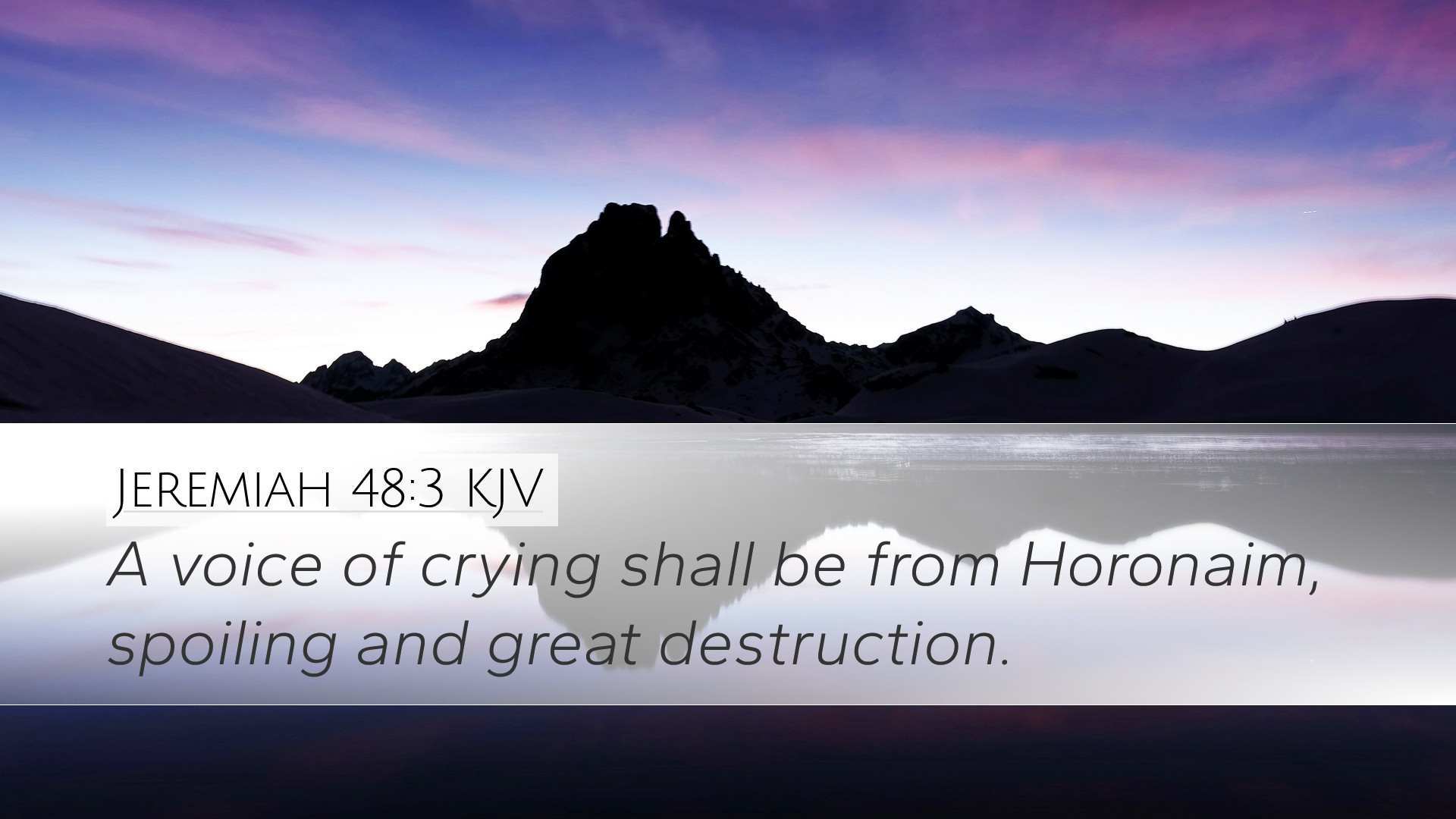Jeremiah 48:3 - "A voice of crying shall be from Horonaim, spoiling and great destruction."
This verse highlights the profound lamentation and devastation expected to befall Moab. In understanding this text, we delve into the historical and theological implications presented in various noteworthy public domain commentaries.
Contextual Overview
The book of Jeremiah is a prophetic work addressed to the nation of Judah during a time of impending judgment. Specifically, chapter 48 focuses on Moab, a historical adversary of Israel. Matthew Henry notes that this chapter serves as a prophecy of Moab’s downfall, a nation that had stood in opposition to God's people.
Interpretation and Theological Insights
1. The Voice of Crying: A Symbol of Despair
Jeremiah uses the "voice of crying" as a poignant metaphor for the anguish that accompanies destruction. Adam Clarke emphasizes that the emotional resonance of this phrase reflects not only physical devastation but a spiritual lamentation as well.
2. The Location - Horonaim
Horonaim is noted by scholars such as Albert Barnes as a significant geographical reference. The mention of this location implies a certainty of devastation that would resonate throughout Moab. The community's very identity is interwoven with its geographical features, and the fall of Horonaim symbolizes a deeper spiritual collapse.
3. Spoiling and Great Destruction
The terms "spoiling" and "great destruction" indicate a complete eradication of Moab’s social and economic structures. Henry remarks on the severity of God’s judgment, which was not just a military defeat but also a spiritual and cultural obliteration, further leading to existential cries of its people.
Historical Context and Prophetic Signs
Historically, Moab was a neighboring nation that had consistently opposed Israel, often representing the forces that sought to undermine God's covenant people. The prophetic words of Jeremiah serve as a divine notification of the pending judgment, illustrating God’s sovereignty over nations.
Barnes discusses the idea that God uses nations and events as instruments of His will. The cry from Horonaim can be seen as a divine orchestration, signaling Moab's failure to heed God’s warnings and their consequent judgment.
Lessons for Today
This verse and its implications bear critical lessons for contemporary believers and leaders within the church:
- Understanding Judgment: The certainty of judgment is a recurring theme in Scripture. Just as Moab faced consequences for its actions against God’s people, contemporary believers are called to reflect on the seriousness of sin and rebellion against God.
- The Power of Prophetic Word: The prophet Jeremiah serves as a reminder of the importance of prophetic voices in society. There remains a need for discernment and vigilance regarding spiritual leaders who call the people back to repentance.
- God's Sovereignty: The overarching theme in this judgment narrative is the sovereignty of God. He is not indifferent to the actions of nations, and His justice, while not always immediate, is ultimately unavoidable.
Conclusion
Jeremiah 48:3 encapsulates a significant moment of prophetic declaration regarding Moab’s downfall. The combined insights from various commentaries illuminate the verse’s depth, encouraging contemporary readers to reflect on their own spiritual conditions and the nature of divine judgment. As we examine this text, we are reminded of the complexities of God's dealings with nations and individuals, and the call for repentance that echoes through the ages.


